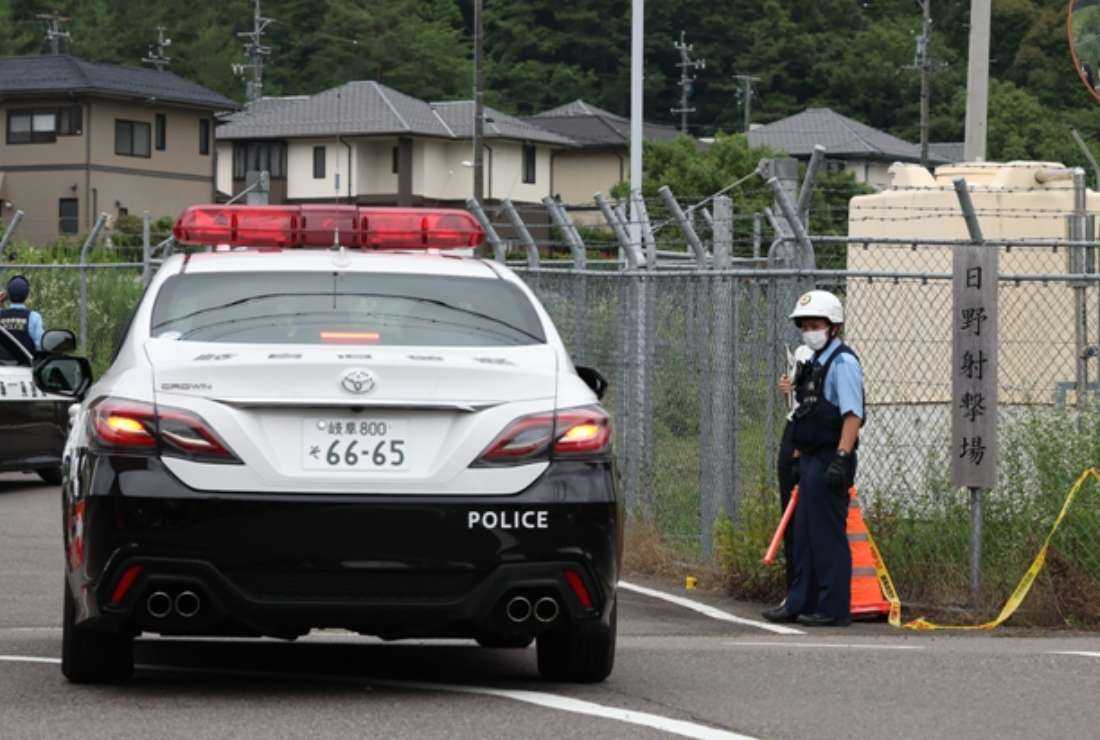
A police vehicle enters the grounds at the Hino basic firing range in the city of Gifu where a new military recruit shot and killed two fellow soldiers and wounded a third in central Japan on June 14. (Photo: JIJI PRESS / AFP)
The news of a recent tragic incident at the "Hino Basic Shooting Range" in Gifu City has been widely shared by the international media. What you couldn’t read though is something that goes beyond the headlines.
The incident brought to light the deteriorating state of the Japanese army and raised concerns about its ability to attract qualified recruits.
On June 14, an 18-year-old trainee self-defense officer during a routine training session fired an automatic rifle at three training instructors, resulting in the death of two officers and injuries to a third.
This deliberate act of violence highlights the alarming consequences of the army's struggle to attract suitable candidates, leading to the inclusion of individuals with intellectual or mental health issues.
The suspect, who had joined the service as a trainee just a few months prior, revealed that his motive for the shooting was a personal grudge against one of the instructors who had scolded him. Additionally, he mentioned difficulties in his relationships with others.
This incident, excluding accidents, is the first intentional rifle shooting within the self-defense force in nearly four decades and raises questions about the adequacy of training protocols and the distribution of live ammunition.
"The army's lack of appeal has led to indiscriminate recruitment practices"
The decline in the quality of officer candidates in the Japanese self-defense force has been a long-standing concern, with recruitment quotas only being partially fulfilled. Only half of the demand is being met even after promoting recruitment on television programs fashioned to exalt all the advantages of enlisting.
If it were any other type of business, say the hospitality industry, we would be talking about an emergency, and surely the Kishida government would be talking about more incentives to be given to the industry to attract more personnel.
The army's lack of appeal has led to indiscriminate recruitment practices, allowing individuals with minor offenses or limited cognitive abilities to enter the force. This compromised recruitment process poses a significant risk, as those unsuited for handling firearms and combat situations may find themselves in frontline positions.
In the context of potential conflicts with well-trained armies like China (whose 35 percent of recruits are conscripts with high standards for eligibility) and Russia (also a mandatory conscription system), the implications of a weak Japanese army are alarming.
The ability to defend the nation effectively is contingent on a capable and well-prepared military force. However, with personnel shortages and mismatches in personnel assignments, the army's overall readiness is compromised. The incident serves as a stark reminder of the urgent need for modernization and improvement in the personnel system of the self-defense force.
Above that we need to also consider that enlisting in the military is not solely a matter of self-defense. It acts as a social safety net for all sorts of people, especially the underprivileged and marginalized communities. It offers several benefits, starting with personal development.
Military service provides a structured environment that fosters discipline, responsibility and self-improvement. It can help young people whose families did not have the means to enroll them in expensive private universities to develop valuable life skills.
Also, joining the military can provide young people with a stable career and job security for life. The service can offer opportunities to travel both domestically and internationally, service members may have the chance to experience different cultures, and work in diverse environments, something that the average Japanese salaryman often lacks.
"Most of the cases where violent incidents have occurred in Japan were caused by unemployed people"
The military provides a steady income, with competitive pay and allowances. This financial stability can be beneficial for young individuals who are seeking financial independence or want to support their families.
Let’s not forget that most of the cases where violent incidents have occurred in Japan were caused by unemployed people. The most prominent of those cases is of course the Shinzo Abe assassination.
As Japan faces a rapidly changing geopolitical landscape, it is crucial to invest in the capabilities and preparedness of its military.
The tragedy at the Hino Basic Shooting Range should serve as a wake-up call for the Japanese army to take immediate action and prioritize the long-term strength and effectiveness of its forces.
Failure to address these issues risks compromising national security and jeopardizing the nation's ability to defend itself in an increasingly complex global landscape. Also, a weaker military, as we have outlined, also impacts the confidence, stability, and preparedness of a generation.
A strong military serves as a pillar of stability, instilling a sense of security and national pride within a country's population.
*The views expressed in this article are those of the author and do not necessarily reflect the official editorial position of UCA News.


